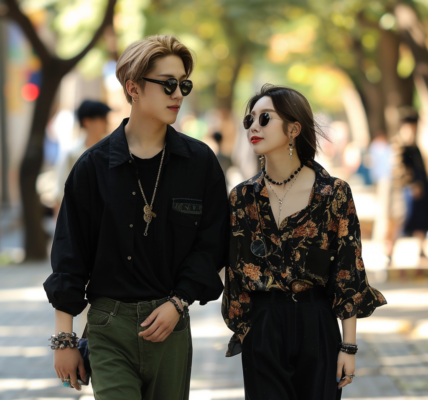On a warm autumn day in Bryant Park, Ivy Wolk, an actress and a prominent figure in the online world, shared a poignant memory from her time at the prestigious Cannes Film Festival. The film festival, known for its glamorous premieres and star-studded events, turned into a moment of distress for Wolk when she was late to the screening of Anora, a film directed by Sean Baker that won the coveted Palme d’Or.
Wolk, who portrays the character Crystal in the film, faced an unexpected hurdle when a French security guard denied her entry due to her tardiness. In that moment of vulnerability, a group of young women who witnessed the incident stepped in to help translate her predicament. However, instead of offering support, they began filming her distressing situation.
“I was having a panic attack in the street, holding my heels, heartbroken,” Wolk recalled, her voice tinged with emotion. “Tears were running down my face. I said to them, ‘Please don’t film me right now. I’m sobbing, crying, dry heaving. This is my movie.'” After a tense few moments, an employee of the theater recognized her and allowed her entry, but the damage had been done. The video of her emotional breakdown was later shared online, quickly going viral on platforms like TikTok and X, further entrenching her status as a controversial internet personality.
Wolk’s experience at Cannes is not an isolated incident; it reflects the complexities of being a public figure in the age of social media. The footage of her emotional moment was branded by some as a sign of her “diva” status, while her loyal followers, particularly in the queer community, rallied around her, turning her distress into a viral spectacle. Yet, for Wolk, the experience was deeply painful.
As she flew back to New York City, grappling with the fallout of the viral video, she resorted to drinking wine she had smuggled onto the plane, using the in-flight WiFi to monitor the video’s spread. “People have been using my image for really nefarious, disgusting purposes for years now,” she lamented, reflecting on the challenges of navigating fame in a digital landscape.
This isn’t the first time Wolk has encountered the darker side of internet fame. She reminisced about a troubling experience from her teenage years at Disneyland, where she was approached by two girls who asked for photos. Initially hesitant, she eventually agreed, only to find out later that the girls had posted those images online as part of a joke, reducing her to a mere meme in their social media antics.
Since the age of 13, Wolk has been immersed in the online world, gaining notoriety for her candid and humorous takes on various topics, including culture and personal health. Her sharp wit and confrontational style have garnered her a substantial following on platforms like TikTok, where she has become a voice for many navigating the complexities of modern life.
However, her rise to fame has also made her a target in the tumultuous landscape of cancel culture. As her profile grew, so did the scrutiny and criticism she faced online. Despite the challenges, Wolk has remained resilient, using her platform to express her thoughts and experiences, often drawing attention to the absurdities of internet culture.
Wolk’s story highlights the duality of online fame: the allure of visibility and the perils that come with it. As she continues to navigate her career in the entertainment industry, her experiences serve as a reminder of the complexities faced by those who find themselves in the public eye, especially in an era where every moment can be captured, shared, and scrutinized by millions.
As the conversation around mental health and the impact of social media continues to evolve, Wolk’s journey resonates with many who have experienced the highs and lows of online visibility. Her candidness about her struggles not only sheds light on her personal experiences but also opens a dialogue about the broader implications of living life in the digital spotlight.
In an age where authenticity is often overshadowed by curated personas, Wolk’s story stands out as a testament to the human experience—one that is filled with vulnerability, resilience, and the ongoing quest for connection amidst the chaos of the online world.





